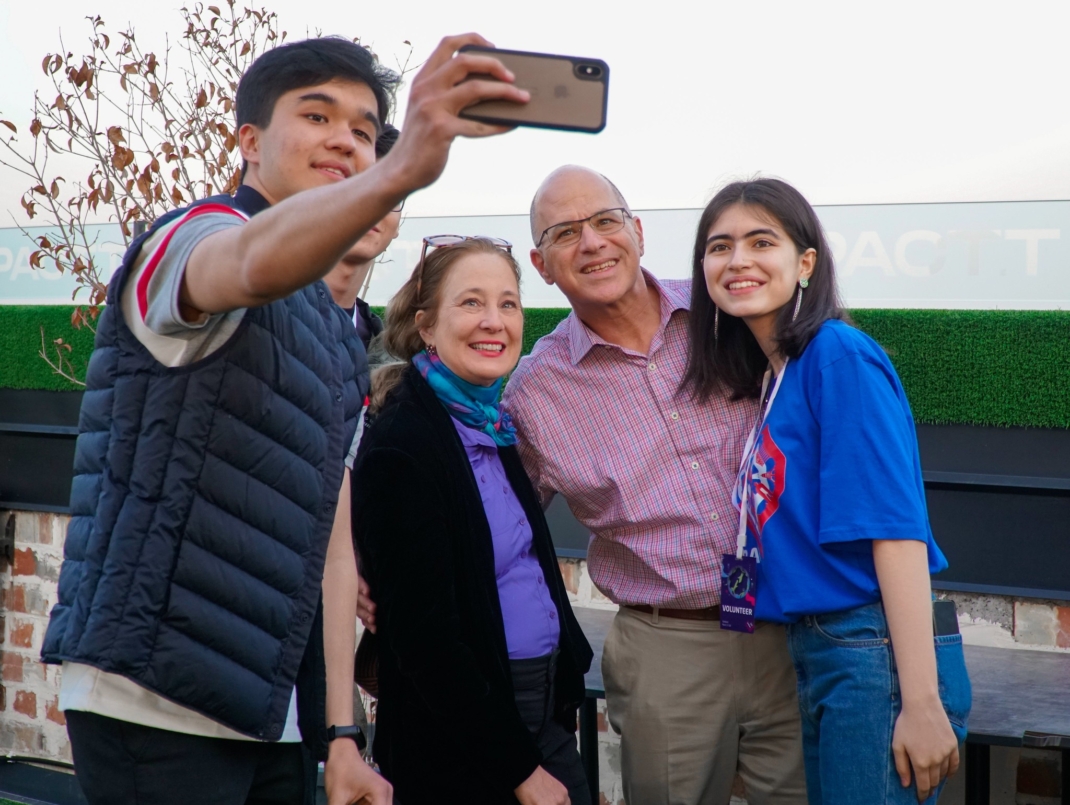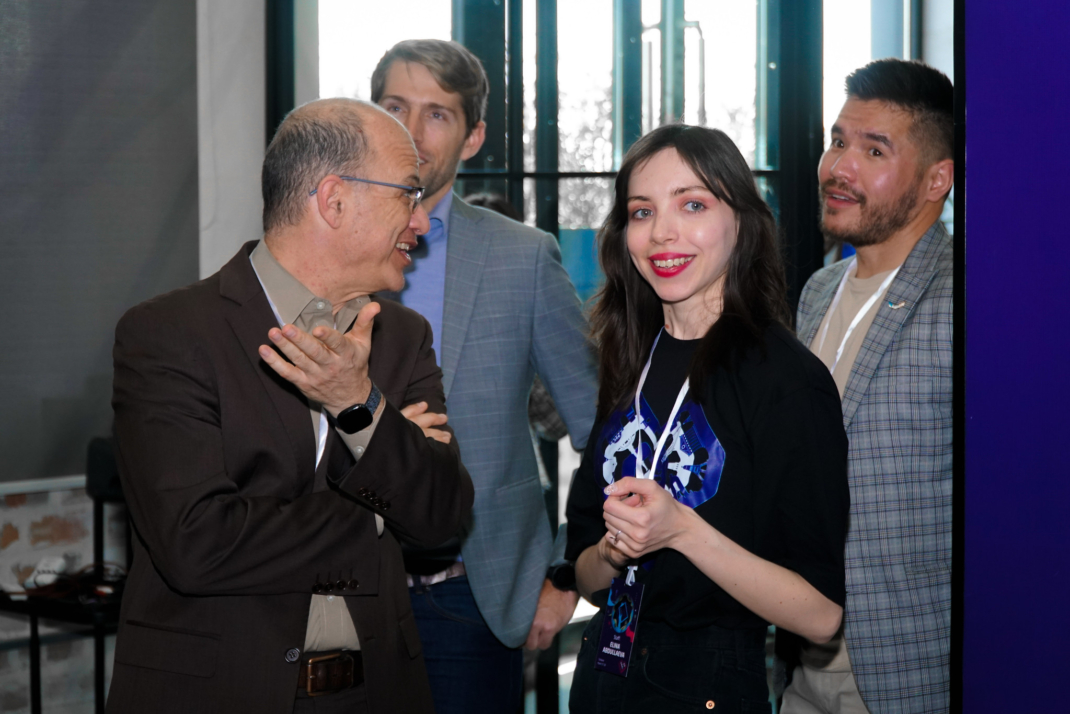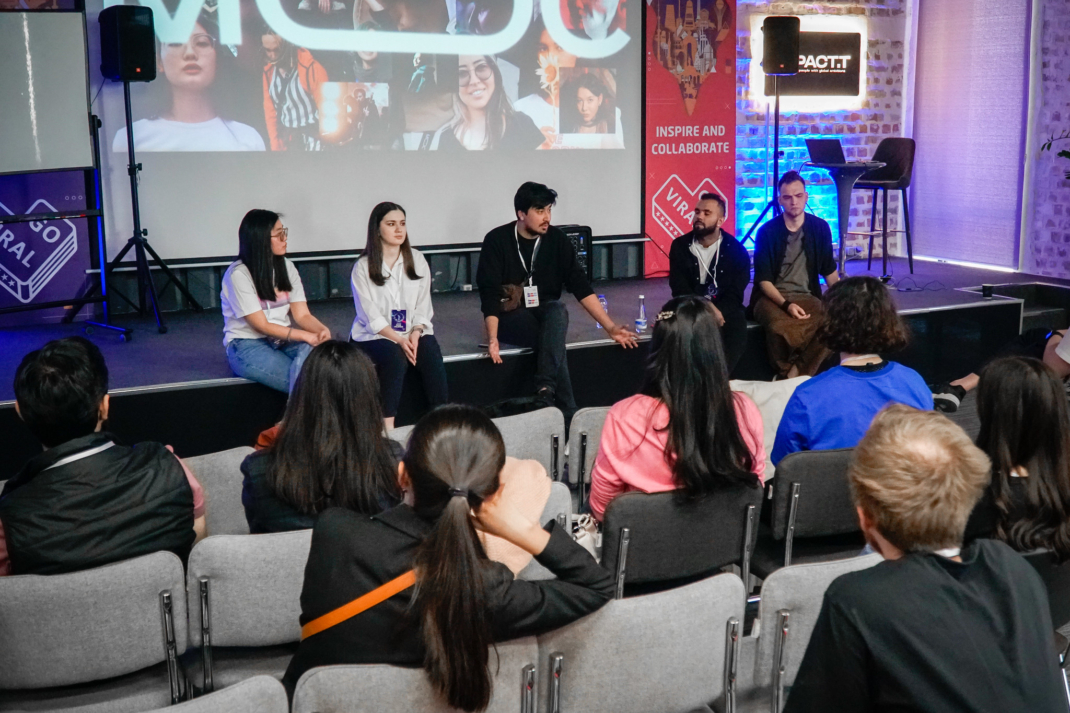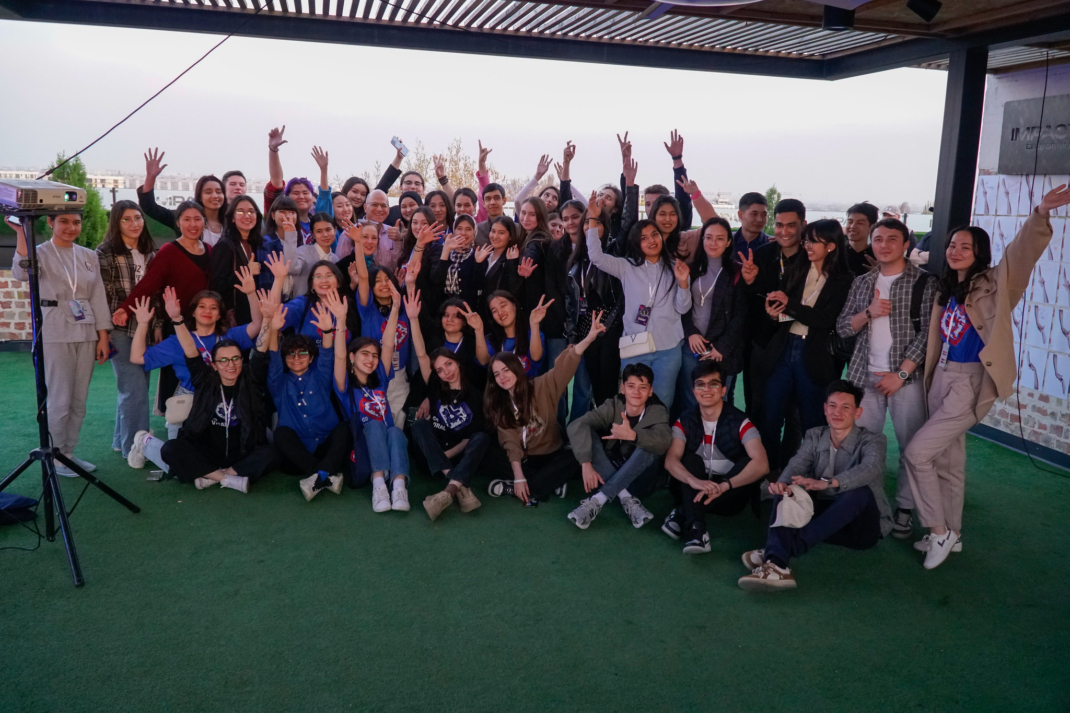On March 17-18, the seventh Central Asian festival Go Viral was held in Tashkent. This is the first in a series of festivals this year that will take place in all Central Asian countries.

The festival brought together experts from the fields of media, business, culture, and information technology with participants who spent two intense days exchanging experiences, learning innovations, getting to know and communicate with each other, and doing practical work.
More than 150 participants were able to attend lectures, master classes and workshops by leading experts from Uzbekistan and Kazakhstan.
The festival was opened by Elina Abdullaeva, Go Viral’s Ambassador in Uzbekistan, and Jonathan Henick, U.S. Ambassador to Uzbekistan.
They spoke about the main goals of the festival, and emphasized the importance of each of the invited guests’ participation in the event in the exchange of experiences, creation and implementation of ideas that will appear on the site of the festival Go Viral.
«I heard about the Go Viral project a few years ago. It’s great that it allows people from different regions of Central Asia to communicate and exchange opinions and ideas. And I am inspired by the future plans of Go Viral. I wish you to spend these two days fruitfully,” said Jonathan Henick.
Ambassador Elina Abdullaeva also gave a welcoming speech to the participants of the festival.

«Go Viral traditionally focuses on four sectors: business, media, culture and technology. This year we decided to address not only the traditional sectors, but also topics at the intersection of different spheres – culture and technology, media and business – because it is in the symbiosis of different areas and knowledge that new ideas are born. That is why I recommend participants to communicate, share their ideas and thoughts, to collaborate. And of course, I congratulate you for being a part of the largest Go Viral event in Tashkent,” she said.
After the official part, participants went to the halls of their chosen sections, where they could listen to and, together with the speakers, apply new knowledge in practice.
One of the coolest highlights was that the halls were named after cities in Uzbekistan – Bukhara, Tashkent and Samarkand. Every day these halls changed spheres and speakers.
On the first day Samarkand hall hosted a workshop on Female characters in Uzbek movies where the speaker Kamila Abdullaeva spoke about female characters in Uzbek movies.
She said that it is a very controversial topic and that it is very important to talk about it. Because through the female characters the historical events that took place in the country, coups, regime changes, etc. were manifested.
«It is very important that it was women at this point who became not only a tool, but also an object of reform. Women’s images in Uzbek cinema were difficult to come to something personal, private, when for the first time their personal feelings, emotions, etc. began to be considered,” she said.
At the end of the workshop, Kamila Abdullaeva shared her impressions, noting that thanks to the event, she saw for the first time the faces of all those interested in the topic of the female gaze in Uzbek cinema.
“I see that these are my peers and people younger than me. They’re all interested in the topic and I think it’s great that there’s an event like this where it’s made possible. Because I’ve never participated in such an event in Tashkent before. And this gives me hope,” said Kamila Abdullaeva.
Features of the “Personal brand” will help you stand out from the gray mass
The workshop «Personal Brand” was of the greatest interest, which was held in the main hall by independent PR-Adviser and entrepreneur Madina Ruzmatova, who opened the first PR school in Uzbekistan.
«A personal brand is a three-dimensional image of a person in society, consisting of his appearance and self-presentation, the transmission of certain values through words and actions, and Instagram is a platform, a resource for presenting oneself,” she said.
During the workshop, she conducted an interactive business game “Personal Brand”, in which she invited participants to create participants to write about themselves on Instagram, taught them to pay attention to various features and methods of presenting information about themselves.
«The first task was to google your name and see what Google says about you – the result was very interesting and even unexpected! The next task was to write 3 interesting facts about yourself. Everyone did well and of course, 90% of the facts presented themselves as “successful success”. We are used to showing ourselves in the best possible way, as if we are the embodiment of the perfection itself. But if we also show our weaknesses, the audience gains confidence in us, and perhaps someone will recognize themselves in you. Your weaknesses can be your features and stand out among the gray mass. And we re-wrote 3 facts about ourselves, imagining that we have no fear of being condemned by society, and the most unexpected facts sounded in the hall. And then, the most interesting: open Instagram and write these three facts in your bio description. Moreover, take a screenshot and put it in stories. It sounds terrifying, but it was this exercise that gave me more confidence. And you can read my three facts here @zziynatt,” one of the workshop participants shares his impressions.
«It is important to follow trends and capture the market with non-standard solutions”
One of the speakers, with whom the participants managed to work practically, was the Kazakh 3D CG designer and artist Zhanar Abrayeva. She spoke about her own development experience in the field of intersection of IT and culture, and also that in five years she was able to work with such major global brands as Adidas, Nike, Vogue, GQ, and others.
The speaker noted that the growth in her career occurred during the quarantine and was quite fast, which she herself believed with difficulty.
«In quarantine, I began to completely immerse myself in the field of virtual graphics and continued to work with Kazakh designers creating joint collections. If you do not know where to start in your work, always start yourself. If you have something to show and tell, be sure to share it on social networks. Because all my customers found me through Instagram. While I was creating avatars, I got into Forbes. If my subscriber had sent me such a page, I would have thought it was a fake,” Abraeva said.
She emphasized the importance of the ability to follow trends and capture the market with non-standard solutions for owners of creative and digital professions.
During her speech, Zhanar clearly showed how AR masks for Instagram are created, which have gained great popularity and are now a way of self-expression not only for authors, but also for brands. She created a mask with the theme of the festival on the spot, and also answered all the questions of the lecture participants.
The economics of creativity. How authors make money on their ideas and how creativity helps business
Marketing Director at the large Uzbek fintech Payme, Nodira Shermatova spoke about the importance of creative ideas in marketing, as well as the ability to generate ideas and be able to present them correctly in the business sector.

In the first, theoretical, part of the lecture, using the example of popular art objects, the participants analyzed the proportions of creativity in them, and also gave a definition of the concept of creativity.
«Creativity is solving a problem in a way that no one has done before. And also this is what a person can do regardless of his talent, financial status and the environment in which he is,” the speaker believes.
In the second, practical part, the participants were divided into three groups and generated problems and their solutions for major global and domestic brands. The obligatory task was to come up with 21 ideas to solve the problems invented by the guys. Each of them the participants were able to analyze and discuss together with the speaker. Nodira Shermatova offered to present the best to the owners of large Uzbek brands.
Critical Thinking: How to Stop the Internet from Fooling You
The master class in the field of media was the analysis of fake news together with the founder of the Hook.report publication Darina Solod.
Participants analyzed several fake news accounts using examples. She showed how to distinguish genuine pages of government departments from fake ones. She also gave links to resources where you can check text and media content for authenticity.
“An important factor in believing in fakes is that we are too lazy to think. If you see that someone is trying to control and press on your emotions, this indicates that someone wants to make money on you. Your money, opinion, influence, and so on. Don’t let people do this,” said Darina Solod.
She mentioned that often users do not realize that they themselves are deceiving their friends, relatives and colleagues.
“Very often, when we read news that obviously impressed us with something, we send it to our friends or parents, because we believe that it is very important for them to be in the know. However, at the moment when we send this post, we don’t think that it could be a fake that we believed in, and now we make our friends believe, too,” she said.
She urged the participants to develop critical thinking, which can often help not to believe fakes, as well as to have a balanced position in relation to any news. Since, according to Darina, the true position may be somewhere in between.
After the master class, Darina shared her impressions:
“I really liked the audience. This is not the first time I speak and I always see when people come interested and they want to learn something and understand something, and when people come because they were driven out for show and they need to be there. The audience was very lively, asking questions and very actively participating in the master class. And I sincerely hope that they will also become small adepts of critical thinking, will read more and develop this skill in themselves and bring it to the masses,” said Darina Solod.
Popularization of the Uzbek language: difficulties in translation
Another lecture that the participants of the festival could listen to was devoted to the Uzbek language and its promotion. It was introduced by translator and poet Sukhbat Aflatuni. The speaker spoke about the difficulties and problems of translations of Uzbek authors.
“In Soviet times, the works of some modern Uzbek writers (Aibek, Kadyri, etc.) were translated into Russian and, in some cases, into foreign languages (usually from Russian). Since the early 1990s, the process of translating modern Uzbek literature has ceased to be supported by government agencies and has become an exclusively individual initiative of authors and translators,” said Sukhbat Aflatuni.
The speaker noted that less and less works of contemporary domestic authors are being translated into Russian or English.
“The only Uzbek author whose books have been translated into English and other European languages since the mid-2000s is Hamid Ismailov. He became famous after his “Railway” was translated by the famous English poet and translator Robert Chandler in 2006,” he said.
Now, according to the speaker, it is important to popularize and draw attention to the Uzbek language. And also to clearly distinguish between the areas that are best known to the world community and are associated with Uzbekistan and develop them.
Uzbek poetry: open microphone in the Media zone
Participants signed up here who wanted to speak with their poems in Uzbek during the “open microphone”, and the workshop itself was not only about poetry, but also about popularizing the literary Uzbek language. It was conducted by Mutabar Khushvaktova.
Participants one by one declared their poems. After the performance, all the verses read were analyzed and discussed by the participants sitting in the hall.
A girl named Bashorat Otazhonova performed with her poem “Ayol” (Uzb. “woman”), which spoke about the difficulties of women, who are sometimes embarrassed that they are women. Her poem touched the audience very much.
Another girl named Mohira Eshpolatova spoke about her relationship with her late grandmother and how important it is to build relationships with your loved ones before it’s too late. The listeners reacted very emotionally to Mohira’s performance.
Moderator Mutabar Khushvaktova shared her opinion after the workshop:
“It was very emotional. All members are very talented. I did not expect such a scale of emotions. I came out and I’m still emotional, I even cried. I came in and thought it was just an open mic, but it turned out to be very inspiring. There was such a friendly atmosphere, everyone supported, respected each other. For them it is a very good experience. I hope there will be more such events,” she said.
Another participant, Kamila Benyatova, shared her impressions of the Go Viral festival.
“I liked the festival very much. The first and second days were very interesting. There was also a very exciting master class on personal branding. The only problem was that the lecture “Female Characters in Uzbek Cinema” and “Personal Brand” were at the same time, and both of them were interesting to me. I wanted to go to both the first and the second. As a result, I sat half in one master class and half in another. There were many more interesting things. And the cool thing is that we met other people. For example, I met Sharofat, who is from Tajikistan, and she is also a director. It’s very cool when you get to know female directors more and understand that you are not alone, and not alone, fighting for a place in this niche, ”she said.

Tashkent passes the baton to the city of Osh in Kyrgyzstan, where the festival will take place April 28-29. Then it will be held in the cities of Dushanbe, Astana and Ashgabat.
The Go Viral project is implemented by IWPR and funded by a grant from the US Department of State. This press release was funded by a grant from the US State Department. The opinions, findings, and conclusions expressed herein are those of the author and do not necessarily reflect the views of the US Department of State.



